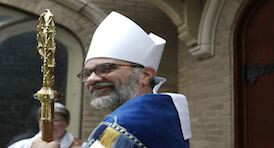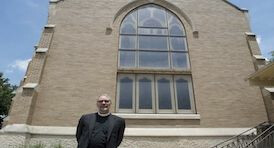So What's Episcopal?

The most stark and basic questions are the best. This one came to me during the evangelism conference here, since what we are sharing is simply the Gospel, but we are bound to do so in an Episcopal mode. How do we keep those distinct but in the right order?
It helps to start with some practical candor. Sometimes we are Episcopal out of habit or inertia, though these don't remove the value of having a reason as well. Sometimes people have become Episcopal as the mid-point between Presbyterian and Roman, which has some rough- and- ready sense. These days, denominations are brands, and people sometimes come as they shop for a good sermon, Sunday school, or choir, though we realize they may leave for the same reason. Finally the question is made harder by the range to be found just within our own congregations.
So where does that leave us? In this at least somewhat ecumenical day, the reasons don't need to be unique to us so long as they do accurately describe us. First we are an apostolic tradition, by which I mean one that emphasizes that the Christian faith is “deep and wide,” going back to the beginning, on to our Lord's return, and global. This means that, though features may vary from one locale to another, they should be recognizable. This is the point of those living symbols called “bishops.” Secondly we are Prayer Book. A shared way of praying that seeks to conserve all it can of our heritage has historically bound us together. This principle will continue to be tested from various angles. Third and finally, as I know Dean Kevin Martin likes to stress, ours is a tradition which has sought a lively encounter with local culture within the contours of Biblical faithfulness.
Will these prove enough to hold Anglicans together over the long haul? God himself knows. Are they contestable? Of course. That is one reason we continue to need serious theological education in the church. We also need to think hard about how we present ourselves to newcomers in a way consonant with these. We are first Resurrection- people, but also ones who have a “goodly heritage.”
Peace,
+GRS




